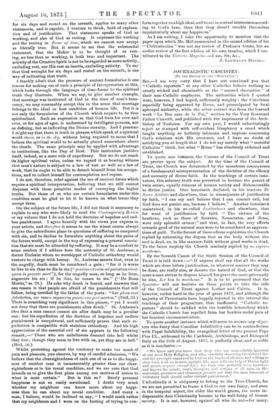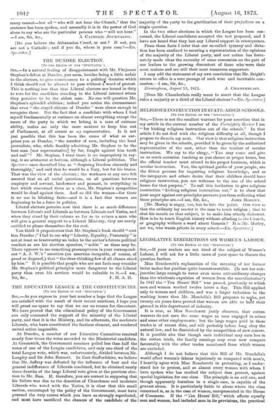JOURNALISTIC CASUISTRY.
[TO TRH EDITOR OF THE "SPECTATOR."]
SIE,-I am very sorry that I have not convinced you that "Catholic reporters" or any other Catholics believe nothing so
utterly wicked and abominable as the "assured damnation" of their non-Catholic employers. The authorities which I quoted were, however, I had hoped, sufficiently weighty ; the Catechism especially being approved by Rome, and promulgated by local episcopal authority, while the other extract was from the learned work "Le Bon sans de la Foi," written by the Very Reverend Father Causetti, and published with the imprimatur of the Arch- bishop of Toulouse. For my own part, I would unhesitatingly reject as stamped with self-evident blasphemy a creed which taught anything so hellishly inhuman and impious concerning God's relations with His creatures, and I have no doubt of satisfying you at length that I do not say merely what "merciful Catholics" think, but what " Rome " has absolutely ordained and established.
To quote one instance, the Canons of the Council of Trent are precise upon the subject. At the time of the Council of Trent, the Church was devastated by the monstrous consequence of a fundamental misrepresentation of the doctrine of the efficacy and necessity of divine faith. In the teachings of certain inno- vators, this salutary truth was perverted to become the parent of twin errors, equally ruinous of human society and dishonourable to divine justice. One heresiarch declared, in his tractate De Servo Arbitrio and elsewhere, that in consequence of justification by faith, "I can say and believe that I can commit evil, but God does not punish me, because I believe." Another heresiarch maintained, in his so-called I nstitutiones and elsewhere, that for want of justification by faith " The virtues of the heathens, such as those of Socrates, Xenocrates, and Zeno, were only splendid crimes ;" and that, in fact, the very efforts towards good of the natural man were to be considered as aggrava- tions of guilt. To the former of these odious sophistries the Church replied by reiterating the dogma that as the body without the soul is dead, so, in like manner, faith without good works is dead. To the latter impiety the Church similarly replied by an express an a thema By the Seventh Canon of the Sixth Session of the Council of Trent it is laid down :—" If anyone shall say that all the works which are done before justification, in whatever manner they may be done, are really sins, or deserve the hatred of God, or that the more a man strives to dispose himself for grace the more grievously he sins, Let him be anathema." It is to be presumed that the Spectator will not hesitate on these points to take the side of the Council of Trent against Luther and Calvin. It is, however, rather hard in the year of grace 1873, and although the majority of Protestants have happily rejected in the interval the teachings of their progenitors, that inoffensive "Catholic re- porters" should be saddled with the horrible heterodoxy which the Catholic Church has repelled from her borders under pain of her heaviest excommunication.
To quote another instance which will serve to answer any objec- tors who fancy that Conciliar Infallibility can be in contradiction with Papal Infallibility, the evangelical letter of the present Pope Pius IX., addressed to the Cardinals, Archbishops, and Bishops of Italy on the 10th of August, 1863, is perfectly clear, and as noble as it is conclusive :—
" We know and you know that they who are unavoidably ignorant of our most Holy Religion, and who, carefully observing the natural law and the precepts engraved by God on the hearts of all men, and milling to obey God, lead an honest, upright life. may with the help of Divine light and grace, oeyuire eternal ; for God, who perfectly 14CD,I, searches, and knows the minds, souls, thoughts. and actions of all men, in His sovereign goodness and clemency, permits not that the man innocent of voluntary fault should suffer eternal punishment."
Undoubtedly it is obligatory to belong to the True Church, for we are not permitted to frame a God to our own fancy, and even in the temporal aspect, the older the world grows, the more in- dispensable does Christianity become to the well-being of human society. It is not, however, against' all who do not—for many, many cannot—but all "who will not hear the Church," that the sentence has been spoken, and assuredly it is in the power of God alone to say who are the particular persons who "will not hear."
[Do you believe the Atbanasian Creed, or not ? If not, you are not a Catholic ; and if you do, where is your case?—ED. Spectator.]































 Previous page
Previous page